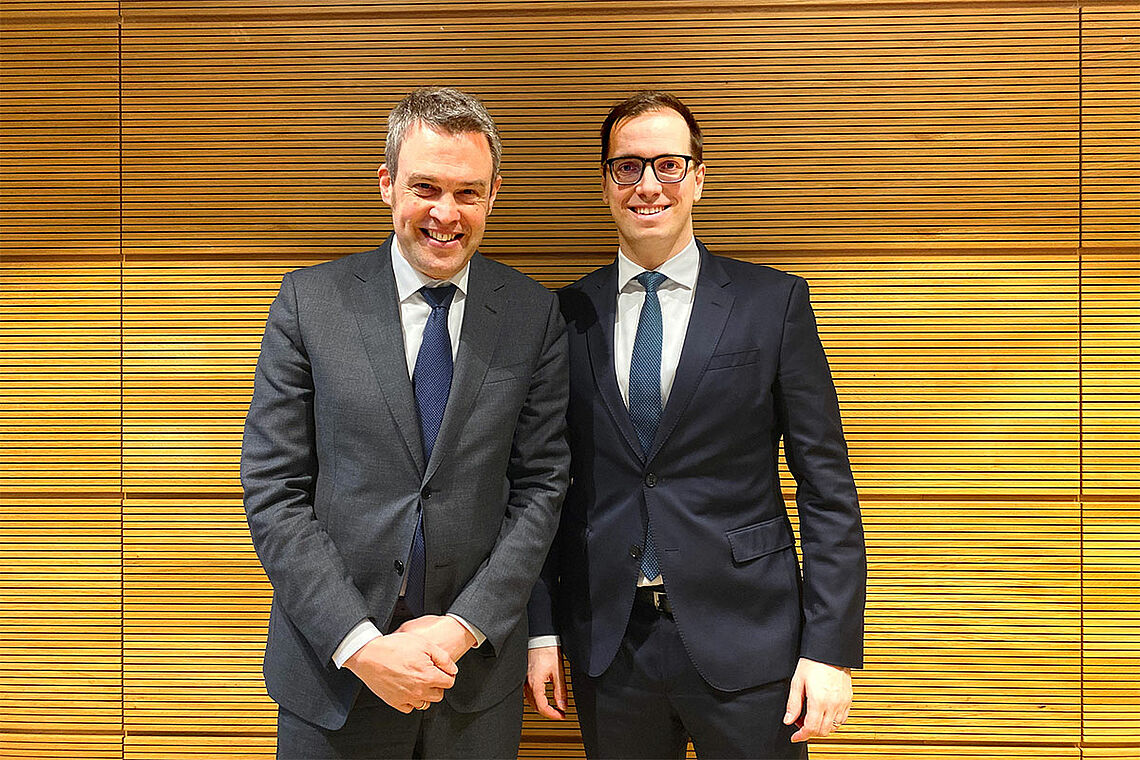With the start of the year, the pace at the European level is picking up. This applies to both, the work of the European notariat as well as the European institutions.
Bundesnotarkammer becomes a member of the CNUE Board of Directors
On 16 January 2025, the annual Passation de Pouvoir, the handing over of powers by the CNUE President and Board of Directors of the previous year to their colleagues of the new year, took place in the Abbaye Neumünster in Luxembourg. The CNUE (Conseil des Notariats de l’Union Européenne) is the Council of the Notariats of the European Union and the European umbrella organisation of the national representations of the notarial profession. Bundesnotarkammer and 21 other European notariats based on the Latin-type notariat make up the organisation. As the CNUE develops the positions of notaries at EU level, coordinates the positions of its member notariats and represents them vis-à-vis the European institutions, it is a key element of the notarial representation of interest in the EU.
Based on an alphabetical rotation principle, the Lithuanian notary Marius Stračkaitis who was the president in 2024 handed over to the Luxembourg notary Cosita Delvaux. This is the first time a woman is chairing the affairs of the CNUE. The also newly elected Board of Directors comprised of Bundesnotarkammer and the national notariats from Austria, Belgium, Malta, Romania and Spain, will support Ms Delvaux during her presidency. Both, the President and the members of the Board of Directors are elected for a one-year term. In 2025, the CNUE Presidency will focus on the protection of adults, cybersecurity and the 10th anniversary of the EU Succession Regulation.
Bundesnotarkammer is honoured to be part of the CNUE Board of Directors again this year and is looking forward to working together with the new CNUE President and the other members of the Board of Directors on the many new European topics scheduled for 2025 - an exciting year awaits us in Brussels.
Work at European level is gaining momentum
Although the new Commission under the leadership of Ursula von der Leyen officially took office already at the end of last year, on 1 December 2024, the substantive work by the European institutions is only now really getting underway. A main focus will be the publication of the Commission's work programme, which has been announced for February. This is because the Commission has the sole right of initiative at European level and therefore the new work programme will set the course for legislation for the current term.
However, due to the lack of discontinuity at European level, some substantive topics are already set for the next five years. Therefore, legislative proposals that were already discussed during the last legislative period, but not yet adopted by the responsible legislators, can be finalised by the newly elected European Parliament and the Council. From a notarial perspective, the legislative packages on parenthood and protection of adults are of particular importance.
The Commission's proposal for a parenthood regulation provides for a harmonised European legal framework to recognise parenthood established in one member state in another member state. As a regulation in the legal field of private international law, the proposal aims at harmonising jurisdiction, applicable law, recognition of decisions and acceptance of authentic instruments in matters of parenthood. In addition, a European certificate of parenthood shall be created.
With the legislative package on the protection of adults, the Commission is taking action in two respects. First, the Commission published a proposal for a Council decision authorising all EU Member States to become or remain parties to the Hague Convention on the International Protection of Adults. Second, the package includes a proposal for a regulation in the field of private international law to accomplish harmonised rules on jurisdiction, applicable law, recognition and enforcement of measures and cooperation in matters relating to the protection of adults.
Yet, it is not only new and continued legislative projects that will keep the EU institutions busy, but also the implementation of legal acts that were adopted in the past legislative term. One major task will be to put the European anti-money laundering package into practice. This comprehensive legal framework will have a direct impact on notaries as obliged entities. As to date, first human resource decisions have already been taken: Bruna Szego has been appointed as Chair of the new European Authority on Anti-Money Laundering and Countering the Financing of Terrorism (AMLA). But not only personnel decisions are being taken, but also the substantive work is starting: within the course of this year, AMLA will have to publish its first draft regulatory technical standards. So, there will be no shortage of exciting news from Brussels this year either.









![[Translate to Englisch:] [Translate to Englisch:]](/fileadmin/_processed_/3/5/csm_GettyImages-520453968_1200x800_d1985608a2.jpg)
![[Translate to Englisch:] [Translate to Englisch:]](/fileadmin/_processed_/1/c/csm_Notariat-BormannLink-DSC_6705_1199x800_e4d12105e2.jpg)
![[Translate to Englisch:] [Translate to Englisch:]](/fileadmin/_processed_/3/6/csm_Company-Law-Conference-Foto-2_1200x800_0997c7ea6c.jpg)